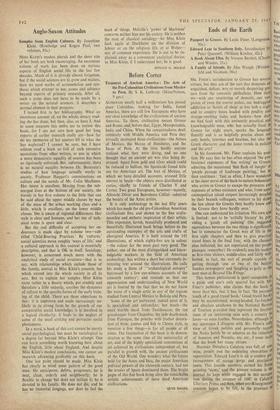Anglo-Saxon Attitudes
Miss KLEIN'S modest plurals and the sheer size of her book are both encouraging. An enormous volume of work has been done on various aspects of English social life in the last few decades. Much of it is already almost forgotten, but if the social sciences are to grow and mature, then we need works of accumulation and syn- thesis which attempt to use, assess and advance beyond reports of primary research. After all, such a point does not have to be made by a writer on the natural sciences; it describes a normal element in their progress.
I turned first to her bibliography. What an enormous amount of, on the whole, dreary read- ing she has done, but then, alas, so have I. And in some measure this unfits me to review this book, for I am not sure how good her long reports of earlier research really are—how far do my memories of her sources• fill in what she has neglected? I cannot be sure, but I have seldom read a book so full of such extensive quotations from other writers, or one in which a more democratic equality of sources has, been so rigorously enforced. But, unfortunately, there is no natural equality between Dr. Bernstein's studies of how language actually works in society, Professor Hoggart's comminations on culture and the novels of Mr. Colin Maclnnes. Her intent is excellent. Moving from the sub- merged lives at the bottom of our society, she travels in her first volume to the little that can be said about the upper middle classes by way of the mass of the urban working class and a little, which is excellent, on the lower middle classes. She is aware of regional differences. Her style is clear and humane, and her use of tech- nical terms is spare and clear.
But the real difficulty of accepting her en- deavours is made clear by volume two—sub- titled 'Child-Rearing Practices.' By 'cultures,' social scientists mean roughly 'ways of life,' and a cultural approach in this context is essentially descriptive, and that is OK in itself. Sociology, however, is concerned much more with the analytical study of social structure—that is to say, with relationships which include those of the family, central to Miss Klein's concern, but which extend into the whole society in all its acts. But to explain her samples Mist Klein turns rather to a theory which, put crudely and therefore a little unjustly, ascribes the dynamics of culture to the specific forms of the early train- ing of the child. There are three objections to this: it is unproven and made increasingly un- likely in its strong form by the growth of our comparative social knowledge; it is involved in a logical circularity; it leads to the neglect of some of the most striking and pervasive social phenomena.
In a word, a book of this sort cannot be merely social psychological, but must be sociological to a degree far beyond Miss Klein's attempt. One can learn something worth knowing here about the English, little about England. And despite Miss Klein's modest conclusions, one cannot see research advancing profitably on this basis.
One last point should be made. Miss Klein has clearly in mind some pattern of the good man.. He anticipates, defers, progresses; he is neat, clean, orderly and neighbourly; he is flexible to change but does not initiate it; he is devoted to his family. He does not die, and he has no immortal longings, nor does he feel the tears of things. Melville's 'power of blackness' concerns neither him nor his society. He is neither the man of classical sociology—let Miss Klein look again at Durkheim on the division of labour or on the religious life, or at Weber— nor of common experience. He is not to be ex- plained away as a convenient analytical device; to Miss Klein, if I understand her, he is good.
DONALD G. mulish


































 Previous page
Previous page